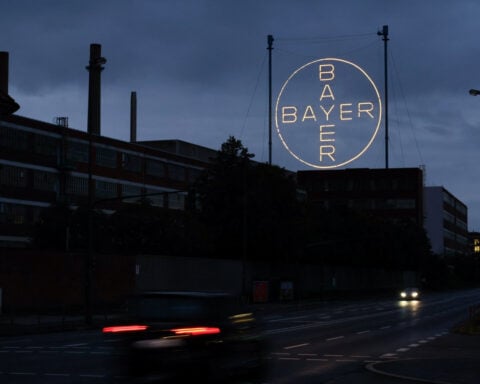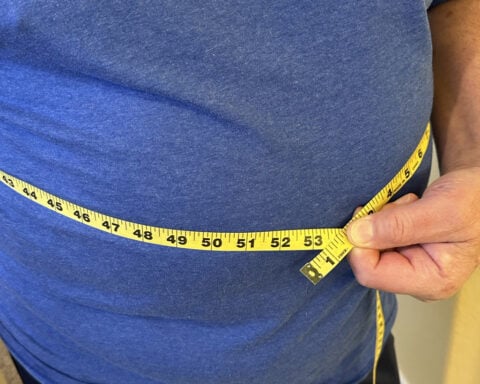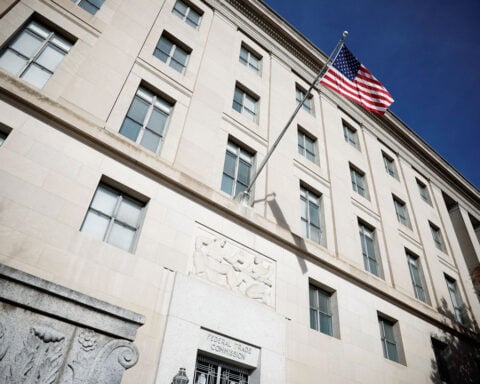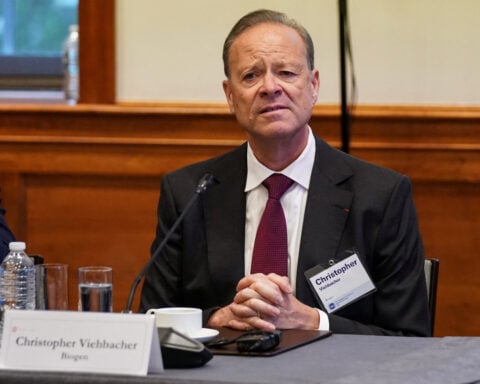TOPEKA, Kan. (AP) — A Kansas judge on Monday put a new state law on medication abortions on hold and blocked older restrictions that for years have spelled out what providers must tell patients and forced patients to wait 24 hours to end their pregnancies.
The ruling was another big victory for abortion rights advocates in Kansas, where a statewide vote in August 2022 decisively confirmed protections for abortion access under the state constitution. District Judge K. Christopher Jayaram's order suspends some restrictions that have been in effect for years. The waiting period had been in place since 1997.
“The Court has great respect for the deeply held beliefs on either side of this contentious issue,” Jayaram wrote in his 92-page order. “Nevertheless, the State’s capacity to legislate pursuant to its own moral scruples is necessarily curbed by the Kansas Constitution and its Bill of Rights.”
Jayaram's order is set to remain in effect through the trial set for the end of June 2024 for a lawsuit filed by abortion providers, against state officials who would enforce abortion restrictions. The providers filed their case in Johnson County in the Kansas City area, home to two clinics that provide abortions.
“Each day these restrictions were in effect, we have been forced to turn away patients for reasons that are medically wrong and ethically unjustifiable,” said Emily Wales, president and CEO of Planned Parenthood Great Plains, which operates three Kansas clinics providing abortion services.
The legal battle highlights the importance of state courts in attempts to preserve access a little more than a year after the U.S. Supreme Court's decision in Dobbs v. Jackson ended protections under the U.S. Constitution and allowed states to ban abortion. In August, a judge in Texas ruled that the state's ban was too restrictive, and the Utah Supreme Court heard arguments on whether it should lift a hold on a state law there banning most abortions.
“These kinds of informed consent laws reflect the long-standing will of the people of Kansas," Caleb Dalton, senior counsel for the conservative group Alliance Defending Freedom, which is helping the state defend its anti-abortion laws, said in a statement. "Kansans are right to want to protect maternal health and safety and the lives of the unborn, and we will continue defending their interests.”
Kansas has been an outlier on abortion among states with Republican-controlled legislatures. The state Supreme Court declared in 2019 that the Kansas Constitution protects a right to bodily autonomy and therefore access to abortion as a "fundamental" right. GOP lawmakers proposed an amendment to the state constitution to declare that it doesn't grant a right to abortion — and in the August 2022 vote, that ballot initiative lost by a wide margin, upholding abortion rights.
Jayaram concluded that the restrictions now on hold violate a patient's right to bodily autonomy. The judge also ruled that they violate doctors' free speech rights by giving doctors “no discretion” to omit any of the material mandated by the state.
“In addition, there is no credible evidence that the mandatory delays imposed by the Act for arbitrary periods of time are likely to, in fact, improve either the consent/decision-making process by pregnant patients or conduct by the medical profession,” the judge wrote.
Republican lawmakers argued this year that “reasonable restrictions" are still fair game. A law that took effect July 1 required abortion providers to tell their patients that a medication abortion can be stopped using a regimen touted by anti-abortion groups. The state agreed not to enforce it until another ruling from Jayaram.
In an August hearing, Jayaram said his reading of medical literature showed that the regimen's effectiveness is not confirmed by any valid studies. Major medical groups consider the regimen ineffective and potentially unsafe.
Providers also attacked existing laws enacted by GOP lawmakers as a way to ensure patients are properly informed before undergoing an abortion. Patients not only must receive medical information 24 hours before the procedure, but that information must also be in writing and in a specific size and style of type. It must include statements drafted by abortion opponents about fetal development and purported abortion risks that major medical groups consider debunked, false or misleading.
In his ruling, Jayaram said that abortion providers had provided “credible evidence” that much of the information that doctors are required to provide is medically inaccurate and “inconsistent with generally accepted science” for embryonic and fetal development.
Attorneys for the providers have argued that the growing layers of restrictions created a biased counseling scheme designed to discourage abortion. Kansas doesn't ban most abortions until the 22nd week of pregnancy.
The providers also said challenging older restrictions became more compelling as other states banned abortion and out-of-state residents flooded them with requests for appointments. Kansas saw a 57% increase in abortions in 2022, according to state health department data.
Alice Wang, staff attorney at the Center for Reproductive Rights, an abortion rights group representing providers, said in a statement that Jayaram's order removed “paternalistic barriers" to abortion access.
“These restrictions are especially harmful now that Roe v. Wade was overturned, and Kansas clinics are overwhelmed with patients from neighboring states where abortion is banned,” she added.
Abortion opponents argued repeatedly before the August 2022 vote that without a change in the state constitution, all existing abortion restrictions could be at risk. The state Supreme Court is reviewing a 2015 law banning the most common second-trimester procedure and a 2011 law imposing tougher health and safety requirements only for abortion providers. Neither has been enforced because of the litigation.
Attorneys for the state and the Alliance for Defending Freedom argue that in suing the state this year, providers are working against their patients' interest in having as much information as possible. Danielle Underwood, spokesperson for Kansans for Life, the state's most politically influential anti-abortion group, said Jayaram's decision left women seeking abortions more vulnerable.
"This is a nightmare for women and a dream come true for the profit-driven abortion industry,” she said in a statement.
____
Follow John Hanna on the X platform at https://twitter.com/apjdhanna

 A look at the events that led up to the detention of South Korean President Yoon Suk Yeol
A look at the events that led up to the detention of South Korean President Yoon Suk Yeol
 The long struggle to establish Martin Luther King Jr. Day
The long struggle to establish Martin Luther King Jr. Day
 Two private lunar landers head toward the moon in a roundabout journey
Two private lunar landers head toward the moon in a roundabout journey
 Trump's Greenland bid stirs debate in China about what to do with Taiwan
Trump's Greenland bid stirs debate in China about what to do with Taiwan
 TikTok preparing for U.S. shut-off on Sunday, The Information reports
TikTok preparing for U.S. shut-off on Sunday, The Information reports
 Japan's Makino Milling requests changes to unsolicited bid from Nidec
Japan's Makino Milling requests changes to unsolicited bid from Nidec
 As Los Angeles burns, Hollywood's Oscar season turns into a pledge drive
As Los Angeles burns, Hollywood's Oscar season turns into a pledge drive
 As fires ravage Los Angeles, Tiger Woods isn't sure what will happen with Riviera tournament
As fires ravage Los Angeles, Tiger Woods isn't sure what will happen with Riviera tournament
 Antetokounmpo gets 50th career triple-double as Bucks win 130-115 to end Kings' 7-game win streak
Antetokounmpo gets 50th career triple-double as Bucks win 130-115 to end Kings' 7-game win streak








